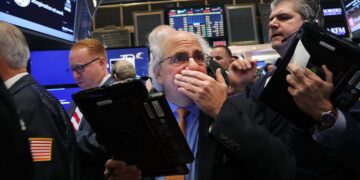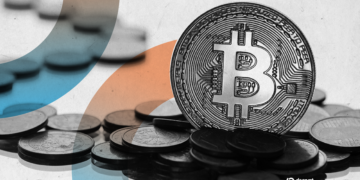When the stock market makes big moves, particularly down, it’s easy to get spooked. New and less experienced investors are more likely to react to these moves by waiting or pulling out of the market.
Find Out: I’m a Financial Advisor: 4 Investing Rules My Millionaire Clients Never Break
Read Next: Mark Cuban Tells Americans To Stock Up on Consumables as Trump’s Tariffs Hit — Here’s What To Buy
Advertisement: High Yield Savings Offers
Powered by Money.com – Yahoo may earn commission from the links above.
If recent stock market volatility has you scared and you think you’ll hold off on investing any further until the market feels “safe,” you are likely going to miss out on corrections and future gains.
Finance experts explained why waiting for a “safe time” is just fear talking, and what to do instead.
Humans are hard wired to avoid danger, so it’s understandable that your reaction to people crying over portfolio losses is to halt your investing, according to Carson McLean, a CFP and founder of Altruist Wealth Management. “Our brains crave certainty, and investing rarely offers it,” he said.
The problem is that most newer investors don’t realize that “the cost of waiting often isn’t obvious in the moment,” McLean said, “it shows up in lost opportunities and the erosion of purchasing power from inflation.” Playing it safe is a move he called “quietly expensive.”
Learn More: Suze Orman: 3 Biggest Mistakes You Can Make as an Investor
If you’re following the reactive behaviors of others whom you know who are also panicking about a change in the market, you’re probably engaging in “herd behavior,” which Robert R. Johnson, PhD, a certified financial analyst and professor of finance in the Heider College of Business at Creighton University calls “a wealth-destroying activity.”
Following the herd leads to mistakes in both bull markets (markets up) and bear markets (markets down), he said.
On the other hand, some people may think they have an edge and can read “when to get in or out before everyone else,” McLean said. But to successfully time the market, you have to be right twice, getting out and getting back in, and be faster than everyone else trying to do the same thing. In other words, highly unlikely.
Johnson paraphrased Vanguard founder Jack Bogle who said, “After nearly 50 years in this business, I do not know of anybody who has done it successfully and consistently. I don’t even know of anybody who knows anybody who has done it successfully and consistently.”
Fear-based investing is emotional and reactive. In most cases, people aren’t being tactical, they’re reacting to headlines, McLean warned. “By the time it feels safe, markets have usually moved on,” he said.
Instead, he urged “strategic investing,” where you follow a process, not a feeling. A strong investment philosophy is designed to work “even when you’re uncomfortable,” he said.
Waiting for the sign that things are all clear usually means the market has already rebounded, McLean said. This happened to people in the 2008 crash, in 2011-12 when the markets wobbled, and in 2020, after the markets reacted to the COVID-19 pandemic.
For a sobering look at just how much you could miss out on by pulling your money out when the market is low or not investing, Johnson shared data from JP Morgan Asset Management’s 2025 Retirement Guide.
If you look back at the 20-year period from Jan. 3, 2005, to Dec. 31, 2024, those who missed the top 10 best days in the stock market saw their return cut by over 40%, he explained.
“Many people have been preparing for a recession for years and have exited the stock market. The opportunity cost of such a strategy can be quite high.”
Instead of reacting to every change in the market or economy, automate your contributions and take emotions out of the process, McLean urged.
“Have a written plan. You don’t need to predict anything. You just need to keep showing up, especially when it feels uncomfortable.”
Johnson suggested that the most effective way to avoid herd behavior investing is to establish an “investment policy statement (IPS) and follow it.” This is best done with the help of a credentialed financial advisor who operates as a fiduciary.
Investing without a plan is like driving without a roadmap or GPS, Johnson warned. “An IPS is a written document that clearly sets out a client’s return objectives and risk tolerance over that client’s relevant time horizon, along with applicable constraints such as liquidity needs and tax circumstances,” he explained.
For the vast majority of people, the best investment strategy is a KISS strategy (keep it simple, stupid), Johnson said. “People should invest in a low-fee, diversified equity index fund and continue to invest consistently whether the market is up, down or sideways.”
This is also known as “dollar-cost averaging,” a simple technique that entails investing a fixed amount of money in the same fund or stock at regular intervals over a long period of time.
At the end of the day remember that “cash doesn’t earn much, and, on average, the stock market goes up,” Johnson said. “Time is the key to successfully building wealth because of the effect of compound interest.”
More From GOBankingRates
Sources
This article originally appeared on GOBankingRates.com: Waiting To Invest Until the Market Feels Safe? That’s Just Fear Talking














